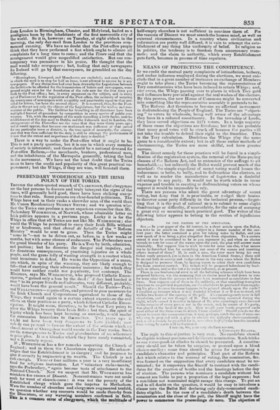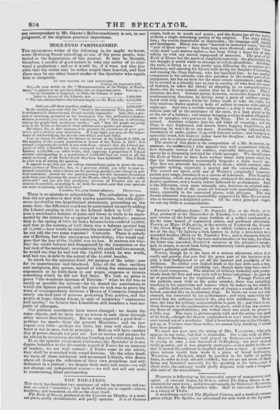MEANS OF PROTECTING THE CONSTITUENCY. IF we credit the mutual
party complaints of intimidation, bribery, and undue influence employed during the elections, we must conclude that in a great number of instances an exchange of Members ought to take place ; the Tories becoming the representatives of Tory constituencies who have been induced to return Whigs; and,
vice versa, the Whigs passing over to places in which Tiny gold and influence have prevailed against the real wishes of the electors. By this process, the new House of Commons might be converted into something like the representative assembly it pretends to be.
The Reform Act threatens to become an effectual instrument in disfranchising the People of England. The Tories are " objecting " to voters by wholesale, being well aware of the advantage they have in a reduced constituency. In the township of Leeds, they have served objections on 2271 voters. In a large majority of these eases the objections are frivolous; but it is too probable that many good votes will be struck off because the parties will not take the trouble to defend their right to the franchise. This is the Tory calculation. Doubtless the Whigs play the same game to a considerable extent; but in all these unfair methods of electioneering, the Tories are more skilful, and have greater success.
The direct remedy for these practices will be found in a simplification of the registration system, the removal of the Rate-paying. clauses of the Reform Act, and an extension of the suffrage to all householdess; but indirectly the Ballot would prevent much of the mischief: the simple expedient of secret voting would lessen the inducement to bribe, to bully, and to disfranchise the electors, as well as to render the manufacture of fagot-votes a doubtful advantage to any party. It would not be worth while to incur expense and trouble in creating or disfranchising voters on whose support it would be impossible to rely. There are persons who admit the great advantage of secret voting, but deny that it is practicable, or °edge' their brains to discover some petty difficulty in the technical process,—forgetting that it is the part of rational men to submit to some slight disadvantage or difficulty, if unavoidable, for the sake of escaping a great evil or securing much practical good. The writer of the following letter appears to belong to the section of injudicious objectors.
TO THE EDITOR OF THE SPECTATOR.
SIR —In your paper of the '2(1 instant, in a short article upon the Ballot, you refer to an article on the same subject in a former number of the current year: the latter contained a plan for taking votes by Ballot, and yon now speak of it as being a plan altogether free from objections. To a certain extent it may be considered to be as you represent it; and when an elector intends to vote for some of the names upon the card, the plan will answer most admirably. But suppose him to wish to vote for some one else, what means are to be furnished him for scratching out some of the names and inserting others instead of them? If, in such a case, she voter must bring his own ticket ready prepared, (as is done in the American United States,) there will be an end both to secrecy and independence in the very cases where the Ballot is designed to preserve them, icy leaving voters to select their own candidates free front external control. The tickets will be prepared beforehand by landlords or others, and so the voter be under influence, as at present. There is one fundamental error in all the balloting schemes which have been proposed hitherto, viz, the assuming that an elector must be tied down to vote for none other than the persons who have been nominated as candidates in due form. Now suppose one of them to die suddenly, or that something transpires injurious to his political reputation, are tl le electors to be precluded from supplying his plat':., because his name happens to be printed already opal' the cards? I recollect an instance when it we' doubtful whether A or 13 was to stand, tiff within two hums of the operMag of the poll. A's canvassing-cards were in full circulation, atol no one thought of II. hut something occurred doting the night, which caused A to retire in favour of II; who accordingly came forward to the surprise of every person not in the secret, and, by means of A's party, was placml at the head of the poll. How wnald your ready prepared cards meet either of the three cases to which I have illitded ? Should you do me the favour to insert this communication, it may, porhaps, catch the eye of snow one who may be prep :red with a plan to obviate the difficulty irbovemientioned ; an], cc ill a remedy he provided for it, mi.n than half (?) the benefits iutended flout votiug by cards will be frustrated. I remit iii, Sir, your very obedient servant, A CONsTANT READER.
The reply to this objection is very easy. No candidate should be eligible without previous and deliberate nomination. Such tricks as our correspondent alludes to should be prevented. A constituency should not be taken by surprise, or proceed upon a blind chanee-medley : some time should be given for ascertaining a candidate's character and principles. That part of the Reform Act which relates to the manner of voting, the nomination, &c. was framed on the supposition that every candidate must be nominated; for it empowers the Sheriff to contract with the candidates for the erection of booths and the hustings before the day of election. The persons who nominate a candidate without his consent are liable to pay a proportion of the legal expenses; but a candidate not nominated might escape this charge. To put an end to all doubt on the question, it would be easy to introduce a clause into the Ballot Bill declaring only duly-nominated candidates eligible. In the case of a candidate's death between the nomination and the close ofr:oheeesoll, the Sheriff might have the
th
power to conmeneo e p ins de nom. The objection of
our correspondent to Mr. GROTE'S Ballot-machinery is not, in our judgment, of the slightest practical importance.



























 Previous page
Previous page